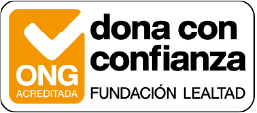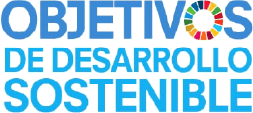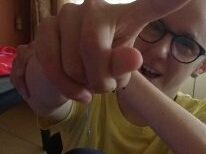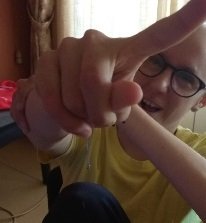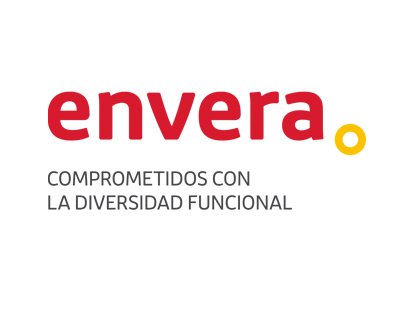Chelo García González, mother of Cris, a cancer patient, and Envera volunteer.
Madrid | February 4, 2022
Since more than 45 years ago, Envera and its parent company, the airline Iberia, began an extraordinary journey with people with intellectual disabilities so that all of them can take their place in the world with dignity, society, also through the CSR of large organizations, has made remarkable progress in inclusion, tolerance and respect, equal opportunities and social justice; however, reality shows us every day that there is still a long way to go, especially when a person with this disability is diagnosed with "cancer".
Chelo García González, a computer engineer, is the mother of Cris, a young woman at the Envera Occupational Center in Colmenar Viejo (Madrid), and also a volunteer in our organization. Her story, and that of her daughter, is the story of so many men and women with intellectual disabilities and their families who, almost invisible, must face one of the greatest challenges of their lives. That is why their voice is so important on International Cancer Day.
My daughter has been diagnosed with very aggressive breast cancer. Cris is about to turn 27 and has a 65% mental disability, which makes her ability to understand what is to come indefinable.
She is a happy girl, she is always laughing and I want her to continue like that, because I trust that, for her recovery, if it is possible, it will be fundamental. On the other hand, I have to bring her all the positive energy multiplied by a billion, because if she sees me badly, she will be bad, and if she sees me well, she will be great.
I have always been a hard-working person, who has given more than one hundred percent to everything I do, stubborn, persevering, meticulous, tireless... A good friend of mine told me yesterday: "Now it's time to fight, and I have never met anyone braver than you".
I could not say when I began to suspect that something was wrong. Nor did I have anyone to share that suspicion with, because I have always been attributed with the fact that I worry too much about Cris, which I have never accepted, because I have worried as much as a mother worries about her children with the addition that she has a mental disability, which implies an above-average attention in many issues. Attention and dedication are not synonyms of protection or excessive concern, it is occupation to take her forward with all the resources you have at your disposal.
After the examination in the emergency room, we received the diagnosis: "It is cancer for sure, now we will have to determine what type and the worst that can happen is that it is Triple X negative". And it is.
So I went on to "get busy", to face the word CANCER, in capital letters, of my daughter. A diagnosis that makes the ground disappear under your feet.
Cancer: in a hyperconnected society, who does not hear that word or read an article in some newspaper, does not know the amount of progress there is, the stupendous expectations of today, the experimental studies that promise so much... You see it and you are happy, but when it comes close to you, you no longer see it so clearly or with so much hope. The word begins to sound as I write it: in capital letters.
Cris has seen many doctors, nurses, assistants, technicians, she has undergone many, many tests, some invasive and some not. She started chemotherapy in May 2021 with six long months ahead of her; on November 25, she underwent a radical mastectomy and the removal of all the lymph nodes on her left side. On January 7, 2022 she has returned to chemotherapy sessions and in a few days she will start radiotherapy. For now we know that it will be about three weeks of radio and chemo until May, when she hopes to celebrate her birthday with this finished.
Today, much progress has been made in raising awareness of what a person with a disability is, but there is still a long way to go for these people to occupy a place equivalent to people who say we have capacity but ... Things are not easy for someone with intellectual disabilities and their families, in this case me, her mother, who takes care of her.
You have to repeat a hundred times that your daughter is a person with a disability and, by the way, that I have hearing loss (Ménière's syndrome: vertigo and hearing loss) and some people understand the situation, speak loudly, repeat it to you, explain it to you and try to reassure her as much as possible about what they are going to do to her.
She is an honor patient if the person treating her knows how to do it. In other situations, unfortunately, they ignore both situations, hers and mine. She gets nervous, doesn't say anything but goes white and I eventually have to take her out of the room and talk to whoever it is alone and then ask for a few minutes to explain it to her in my own words. You leave with an incredible feeling of depression, because I know that my daughter can understand perfectly well what a test consists of if you explain it to her. She does not understand what cancer is, she knows it is a disease, nothing more, but the lack of knowledge of what they are going to do to her makes her anxious as it does any other person with capacity. Empathy, I think that is the key to soften so much suffering.
In spite of everything, we have been fortunate to find more professionals who have been able to adapt to our conditions than those who have not wanted to. We have had the great support of the Envera Group, where professionals and colleagues have supported Cris beyond imagination.
Cris says: "I am not afraid of cancer, I am afraid of the pain", (she has had really unbearable pain and has suffered it without an "ouch" louder than a whisper). She also had a very hard time with biopsies. The MRIs, which are face down, made her very uncomfortable, even more so with the mask. The intervention to install the reservoir for the chemo was passed conscious while tears were falling, but she did not move.
Cris is afraid of health professionals and doesn't want to be alone with them in case she doesn't understand them. She doesn't feel safe, but that's what life has taught her, because she is a very forward-looking girl; but who doesn't get exhausted when you see that the world doesn't want to understand you!
She didn't mind losing all her hair, it will grow. She doesn't even look weird with only one breast, although she wants to have her breast reconstructed when everything is over, so we can talk about it and decide what's best for her, together.
We have come a long way in the integration of people with disabilities, but we have only started the journey, the road is very long, there is a lot to do when life puts you in front of a challenge like this, without special resources and with "do what you can" as the only recipe.
Today I asked Cris what she would tell a person with cancer. Her answer was: "That you have to be brave and that you have to live happily, that you are going to be cured and that you only have to think that everything is going to be fine, that you should not stop, even if you are tired, that if you sit down you will not get up; that you should put everything on your side and that you should think that you will succeed".
Cris gives me a life lesson every day. Her battle cry is "go for it". She has changed our lives, everything looks different, we know what is important and what is not. And I can assure you that my daughter, whom I adore, is the bravest person in the universe.
Everyday Cris and Cris are an example of resilience and courage to live and also deserve to occupy with dignity a place in the midst of the disease so that all their efforts, the zeal of science and the professionalism of health care workers can achieve their goal. A commitment to social responsibility that can wait no longer, a commitment to empathy, consideration and respect that, beyond science, is relief and hope.

